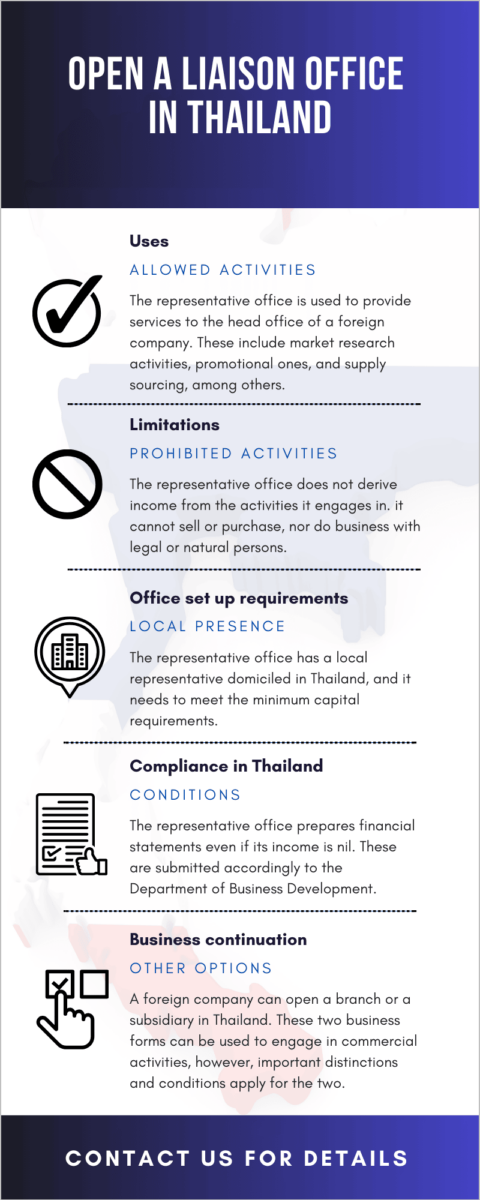A foreign-owned business may establish a presence in the Thai market in the form of a liaison office for marketing and other non-transactional purposes. Setting up a representative office is easier to establish than a branch office, thus making it the simplest and fastest way for an offshore company to build a physical presence within the country. No matter if you choose to open a representative office or a branch office, our company registration agents in Thailand are at your disposal.
| Quick Facts | |
|---|---|
| Best used for | Companies that do not need to engage in commercial activities in Thailand. |
|
Approvals |
The permission of the Business Development Department and the approval of the Foreign Business Committee are needed. |
|
Types of activities that are not subject to taxation |
Marketing and promotional activities concerning the head office’s goods and services, overseeing the goods purchased from Thailand by the head office, finding sources for purchasing goods or services from Thailand, etc. |
| Taxed representative office activities | Buying or selling goods, engaging in any activity from each income is derived. |
| Judicial capacity |
The representative office is a legal person incorporated according to foreign business laws. |
| Limitations |
It cannot sale or negotiate business with natural or legal persons, it cannot derive income from the services offered to the head office, except for using the funds received from the head office to cover its local Thai expenses. |
| Tax rate (if engaging in taxable activities) |
20%, reduced in some cases |
| Tax registration for the Thai representative office |
A corporate tax identification number is assigned to the representative office even if it does not engage in commercial activities. |
| Reporting |
The representative office submits income tax returns and audited financial statements even if they are nil. |
| Minimum capital | At least 25% of the estimated average yearly operating expenses, however, not less than 3 million Baht. |
| Fees |
A non-refundable representative office fee applies. If the activities are approved, a Government fee will be calculated according to the parent company’s registered capital. |
| Staff |
Local and foreign staff working for the representative office need to have taxpayer cards and are subject to personal income tax in Thailand. |
| Alternatives to the representative office in Thailand |
International Headquarters, Branch, Private Limited Company, Public Limited Company. |
| How we can assist you |
Our team can provide complete assistance for the set up of a liaison office in Thailand, or for changing the business form, if needed. |
| When to contact us for assistance | As soon as the Board decides to open a Thai representative office or as needed to decide on the most suitable business form to use in the country. |
Choosing the right business form is an essential step. The representative office can be a springboard for companies interested in first testing the Thai market. However, as the business progresses and foreign investors may be interested in changing the business form to a permanent establishment, our Thai company formation experts can assist as needed.
Table of Contents
Characteristics of Representative Offices in Thailand
Representative offices are the most known forms of non-trading legal entities available in Thailand. They are used by foreign investors to perform specific functions such as management services, training, general marketing, and sales promotions between the head office and the representative office and can be 100 percent owned by foreigners.
In order to open a company in Thailand, a set of requirements must be regarded. A liaison office is regulated by the Thai law to engage in at least one of the following activities:
• Supply goods or services in Thailand for the overseas head office;
• Inspect and control the quality of goods purchased by the head office for manufacturing purposes in Thailand;
• Provide advice on various aspects of goods sold by its head office to its distributors and customers in Thailand;
• Supply the information concerning goods or services of the head office to the customers of Thailand;
• Report on the local business and economic development and activities to the head office.
The representative office does not have the authority to sign contracts or negotiate business in Thailand with any natural or legal person. In many aspects, the office is limited to a number of basic activities, however, these can be valuable for a foreign company that needs to test the market before committing to opening a permanent establishment in Thailand.
Our company registration agents in Thailand can give you more details about the activities of a representative office.
Documentation for setting up a Representative Office in Thailand
To be able to set up a liaison office in Thailand, the foreign applicant (the mother company) is first required to apply for a Foreign Business license (Alien Business license). To do that, the mother company must transfer a minimum working capital of 5 million baht for the representative office in Thailand which might require obtaining additional licenses.
After the process of obtaining the Foreign Business license (Alien Business license) is concluded, it is required to provide a number of documents of the mother company:
• Foreign Business license;
• Mother company’s affidavit that includes: company name, registration number and date, address, and the jurisdiction in which the company is registered;
• Articles of Incorporation or Memorandum of Association;
• Name, age, nationality, race, and address of each director and number of shares owned by each;
• Total number of shareholders, their nationalities, and number of shares owned by each national group;
• Report on the company’s total capital, number of shares, and amount of capital stock.
When the company is part of a group or is an affiliated company, the documents will also include the details of this group (names, principal business, country of registration, as well as the head company’s percentage of shareholding in the group).
The documents mentioned above must be notarized and certified by the local Thai consulate or embassy and they must not be more than six months old at the time of addressing to the Commercial Registrar.
The aforementioned documents (and others, as may be required by the Thai authorities on a case-by-case basis, depending on the particularities of the foreign company opening the office) are signed by the responsible person, the assigned liaison office representative. The responsible person undertakes and certifies the accuracy of the provided information, as well as that of the documents offered as evidence for the registration of the new representative office in Thailand.
To be able to prepare your documents, complete the legal process of registering your liaison office in Thailand, and apply for the Foreign Business license, you will need the help of a Thailand company formation expert.
We also invite you to watch a short video:
Special requirements for representative offices in Thailand
Although they are used mainly for liaison and promotional activities, these types of offices are allowed to engage in their specific activities in Thailand only when they comply with a clear set of rules, among which to have a minimum capital.
While not subject to the same steps for company formation in Thailand, it is important to keep in mind that the representative office needs to have a minimum capital remitted to Thailand once it starts its business operations:
- The first 25% of minimum investment within the first 3 months;
- The next 25% of the minimum investment within the 1st year;
- 25% within the second year and the last 25% within the third year.
The representative office’s total liabilities cannot exceed a certain value, calculated as seven times the inward remitted funds for the operations.
When the liaison office hires employees, it will need to follow the regular steps for making the needed social security contributions. All its staff (whether local or foreign) will need to have taxpayer cards and will be subject to the personal income tax in Thailand. These regulations concerning employees are applicable to all companies and are an important issue for Thai company formation.
In addition to the aforementioned minimum capital conditions, the following are relevant for the representative office:
- it must have at least one of the assigned responsible officers who is a Thai resident (this means having a regular residence in the country, not a temporary residence or address);
- it will prepare the annual financial statements and submit them to the Department of Business Development;
- the representative office is subject to submitting a non-refundable fee.
Once more, the representative office cannot engage in offering services to individuals and will receive its funding from the head office (the foreign company interested in testing the Thai market). The office is still required to have a corporate tax identification number and submit the returns, as mentioned above. Using the services offered by our accountants in Thailand is therefore as relevant to representative offices as to other business forms. You can reach out to our team for information about our packages that are tailored to the needs of these offices.
Alternatives to the representative office
As the permitted activities of the representative office may become insufficient, the foreign company may take into account changing this business form to meet its new business needs in Thailand.
Opening a branch or a subsidiary is an option for foreign companies interested in setting up their permanent establishment in Thailand. While the branch is an extension of the parent company abroad, and it is also devoid of legal personality, like the liaison office, the corporation (be it public or private) is a separate business form, thus offering limited liability.
Our team can detail the procedures for branch and company creation in Thailand, as well as provide investors with extensive information on the differences between the existing business forms.
For more comprehensive information regarding the process of setting up a representative office, please contact our Thai company formation consultants for support.



